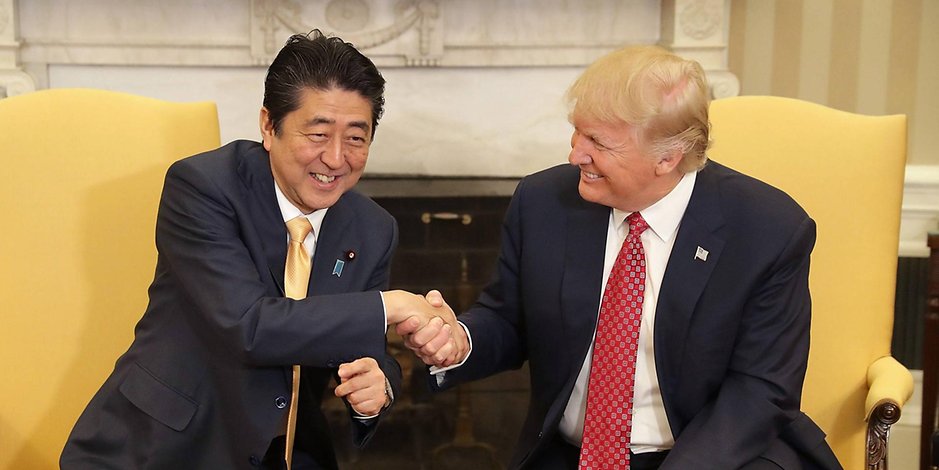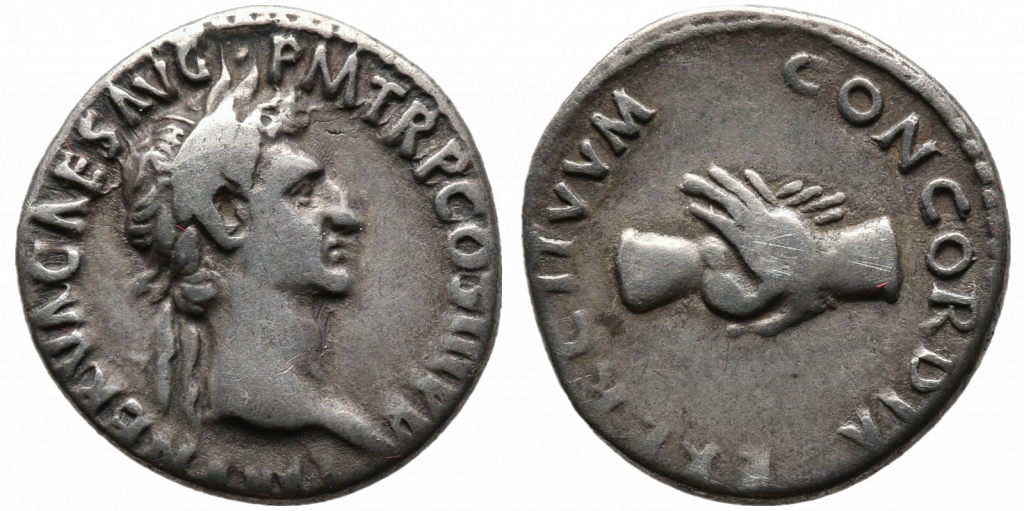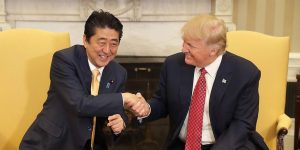Ein Handschlag mit dem Kaiser: Kommunikative Akte
Fabian Gapp
Bei einem Besuch Merkels im Weißen Haus 2017 verweigerte Donald Trump ihr den Handschlag – so zumindest der Vorwurf der Medien, der zu viel Kritik führte. Symbolische Gesten spielen in der Politik eine wichtige Rolle, und taten dies bereits in der Antike.

Die Verbindung der rechten Hände (dextrarum iunctio) war Ausdruck besonderer Nähe und Verbundenheit, auch in politischer Hinsicht. Bereits die römischen Münzen greifen daher dieses Symbol auf. Neben Gesten waren auch ritualisierte Handlungen ein wichtiger Bestandteil kaiserlicher Kommunikation: das Opfer an die Götter, der Aufbruch des Kaisers in den Krieg (profectio), seine siegreiche Rückkehr (adventus) und auch seine Ansprache an Volk oder Heer (adlocutio).
Damit konnte er unterschiedliche Zielgruppen ansprechen und deren Zuspruch zu seiner Herrschaft sichern – der Kaiser war in seiner Macht nicht unantastbar, sondern musste seine Leistungen für das Römische Reich gegenüber den Bürgern in Rom und den Provinzen, der politischen Führungsschicht (v.a. dem Senat) und den Legionen immer wieder unter Beweis stellen.

Bei der Kommunikation zwischen Kaiser, Volk, Senat und Heer spielten auch die jeweiligen Orte eine wichtige Rolle. Denn in einem Tempelbezirk mussten andere Regeln beachtet werden als in einem Militärlager, in den Provinzen kämpfte man mit anderen Problemen als in der Hauptstadt Rom.
Die Bedeutung der unterschiedlichen Zielgruppen veränderte sich im Laufe der Zeit. Durch die enorme Größe des Römischen Reiches, das unter Trajan im Jahr 117 n. Chr. die größte Ausdehnung erreichte, nahm der Einfluss des Militärs enorm zu. Im 3. Jahrhundert n. Chr. riefen die Heere eigenständig neue Kaiser aus, was zu zahlreichen Konflikten und instabilen politischen Verhältnissen führte.
Auch war Rom zu dieser Zeit nicht mehr der eigentliche Aufenthaltsort des Kaisers. Er kämpfte ständig an den Grenzen des Reiches und musste die immerwährenden Bedrohungen abwehren. Deswegen waren die Besuche des Kaisers in den Städten des Römischen Reiches und seine Fürsorge für die Zivilbevölkerung von besonderer Bedeutung.
“2017年,德国总理默克尔访问白宫期间,总统特朗普拒绝在会晤时与她握手”——至少大众媒体是如此对特朗普加以指责的,他本人也因此倍受批评。由此可见,礼仪性的动作和姿态在政治中发挥着举足轻重的作用,自古以来便是如此。
二人右手相握(dextrarum iunctio)意味着政治上的亲密和团结,这在古罗马时期的钱币上便有所体现。除了这些礼仪性的动作和姿态,很多公开仪式亦在交流中扮演着重要角色:如罗马皇帝献祭诸神,离朝亲征,凯旋归国(adventus),面向公民和军队的演讲(adlocutio)等等。罗马皇帝需时刻与不同的目标群体沟通,以确保他们的支持——皇帝的统治权并非神圣不可侵犯的,他必须时刻向罗马城及行省人民、精英阶层(尤其是元老院)和军团证明自己的丰功伟绩。

皇帝与人民,元老院和军队进行交流的场合与地点发挥着至关重要的作用,圣所神殿的交流模式需比军营更为审慎,行省的公民面临的挑战也必然和都城内的不同。不同目标群体的重要性也在不断变化。由于图拉真治下的罗马帝国疆域(公元117年)达到前所未有的规模,罗马军队的政治影响力迅速提升。至公元3世纪,不同军队各自拥立自己支持的皇帝,此举导致了数不胜数的冲突,战争和动荡飘摇的政局。
3世纪的罗马城不再是罗马皇帝真正意义上的居所了。皇帝需不断在罗马帝国的广袤边界上奋战,以抵御外敌入侵。正因如此,对于这一时期的皇帝而言,造访行省城市并显示他对平民疾苦的关心至为重要。
During Merkel’s visit to the White House in 2017, Donald Trump refused to shake her hand – at least he was accused so by the media and much criticized. Symbolic gestures play an important role in politics and have done so since antiquity.

The connection of the right hands (dextrarum iunctio) meant closeness and solidarity, also in political terms, and is shown on Roman coins. Not only gestures, but also public rituals were an important part of imperial communication: sacrificing to the gods, the emperor’s departure to war (profectio), his victorious return (adventus), and his speeches towards citizens or troops (adlocutio).
The emperor had to address different target groups to assure their support – he did not possess absolute power, but had to prove and communicate his achievements for the Roman Empire towards the citizens of Rome and of the provinces, the political elite (especially the senate) and the legions, and in the right way.
In the communication between emperor, people, Senate and army, it played an important role where exactly this communication took place. In a sanctuary, different rules had to be obeyed than in a military camp, the citizens in the provinces struggled with different problems than the people in the capital.
The importance of the different target groups changed as well. Due to the enormous size of the Roman Empire largest under Trajan in AD 117, the political influence of the military increased enormously. In the 3rd century AD, the armies independently proclaimed emperors which led to numerous conflicts, battles and unstable political conditions.
Also, at that time Rome was not the actual residence of the emperor. He constantly fought on the borders of the empire and had to prevent invasions. Therefore, the emperor’s visits at that time and his concern for the civilian population were of particular importance.
